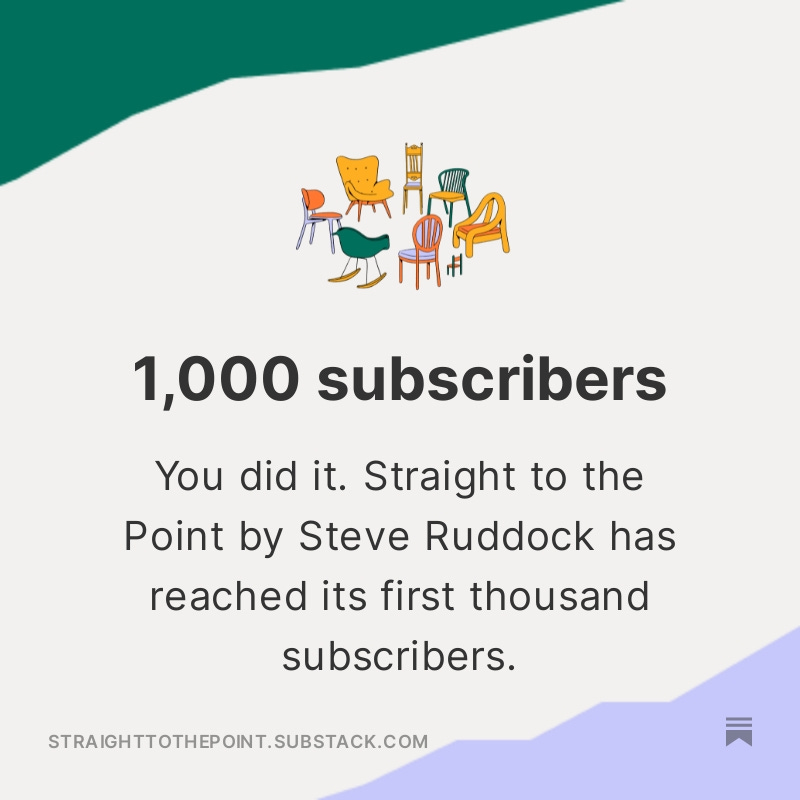Under One Roof
The gambling industry is an overly complex place. Fortunately, there are companies like IXUP trying to simplify and streamline the process.
The Bulletin Board
NEWS: IXUP looks to streamline the voluntary and involuntary exclusion process… and that’s just the beginning.
ICYMI NEWS: Stories and updates from around the gambling universe.
NEWS: Say hello to the RGAA, a new industry trade group representing gambling affiliates. I have some thoughts.
VIEWS: Teenage brains: When should someone be introduced to gambling?
AROUND the WATERCOOLER: West Flagler doing West Flagler things.
STRAY THOUGHTS: Be prepared.
SPONSOR’S MESSAGE - Underdog: the most innovative company in sports gaming.
At Underdog we use our own tech stack to create the industry’s most popular games, designing products specifically for the American sports fan.
Join us as we build the future of sports gaming.
Visit: https://underdogfantasy.com/careers
Streamlining the Process: Is RegTech the Solution?
This is a longish entry for the newsletter, but I felt it deserved to be on everyone’s radar and required a detailed explanation.
I’m constantly impressed with the products lurking right below the surface of the online gambling industry. Many of these products are designed to streamline what is often an overly complicated regulatory environment. One such company is IXUP.
IXUP (pronounced eyes-up) is an Australian company focused on applications of encryption technology. The company initially focused on the banking and healthcare sectors, and now, after an investment from Tekkorp, IXUP has entered the online gambling arena.
I recently spoke to Kevin Vonasek, who was tapped to lead IXUP’s entry into online gambling.
“IXUP’s goal is to help companies who have databases and desire some form of collaboration, but via their own competitive interests, and/or due to certain data privacy laws, are unable to collaborate with others even though such collaboration would be mutually beneficial,” Vonasek said.
“The first use-case we wanted to tackle was voluntary and involuntary exclusion management, an area where we felt inefficiencies in data collaboration existed due to an inability to distribute and share sensitive Pii data.”
To accomplish this, IXUP purchased PlayPause from Conscious Gaming (a product that first appeared on my radar in 2020).
“The goal of this product is to provide operators with a single point of integration, via a real-time API, that provides both voluntary and involuntary exclusion data from every regulated gaming state and sports league,” Vonasek said.
Here’s how it works.
IXUP encrypts the data one way and aggregates all of these encrypted lists into a central cloud datastore. An operator can then ping the PlayPause® network (via the same one-way encryption API, encrypting the patron’s first name, last name, date of birth, and last four social) to perform matching analysis on the encrypted datasets.
Solving a Serious Problem
The problem IXUP solves is that when they submit exclusion lists (players, referees, owners, trainers, etc.), leagues only want to provide publicly available data, which leads to false positives.
“If a league sends you a list that only contains a last name and date of birth, that's not going to be very helpful to you,” Vonasek said. “Therefore, operators cannot automate actions to suspend patron accounts preemptively. This is because they cannot rely upon the accuracy of the data.”
And this is a bigger issue than you might imagine.
“The stats I often use are there are a little under 200 million Americans between the ages of 21 and 65 today. That equates to about 16,500 possible dates of birth for anyone who’s between the ages of 21 and 65 today, meaning they share their date of birth with about 12,000 other Americans. If you look at the most popular American names, like “Smith,” there are about 1.5 million “Smiths” in America between the ages of 21 and 65. That means every “Smith” shares their date of birth with just under 100 other “Smiths.” When you then look at the “Smiths” that exist in all the leagues, minor leagues, front offices, and officials across men’s pro sports, collegiate sports, women's pro sports, etc., it starts to add up. Meaning, you could have tens of thousands of “Smiths” who match as a false positive, and that’s just one last name.”
False positives are not perfect matches. A secondary problem IXUP can solve is determining the match threshold for a positive match.
“One of the reasons we want to do the pilot is that we have data and theories on what the thresholds should be,” Vonasek said. “Each list is different, and running a pilot with real states, leagues, and operators will actually help us find the perfect sweet spot between not letting anyone slip through the cracks and having too many false positives.”
Who Will Take the Plunge?
The issue is IXUP needs stakeholder buy-in.
“When we leave a new presentation with a league or operator, we often get, “This seems like a better way to do this. This seems like a good thing. This seems like where we need to go as an industry,” Vonasek said. “However, getting stakeholders from that point to saying, “Okay, we’re ready to saddle up and help move the industry in that direction,” that’s an entirely different story.”
As noted above, exclusion lists are IXUP’s first use case. Down the road, it could create databases for AML, bonus abuse, and any other network data.
“Operators are often forced to lock a patron’s big win to check against a “deadbeat dad” database before releasing the funds,” Vonasek noted. “Currently, this is a tedious and manual process.”
Sponsorship opportunity
Want to sponsor the fastest-growing newsletter in the gambling space? Straight to the Point has multiple sponsorship opportunities available.
Reach out to Steve at iGamingPundit.com for more details.
ICYMI: NC Regs, Michigan Sweeps, M&A, Seneca Compact
The second round of North Carolina sports regulations has been published. The 256 pages of regulations include (mostly standard) responsible gambling and marketing regulations.
With an assist from attorney Michelle Cohen, Pokerfuse tackled the very complicated issue of sweepstakes gambling in Michigan, where Golden Hearts Games (GHG) and Virtual Gaming Worlds (VGW) are leaving or planning to exit Michigan. Again, this is a topic I will explore in the coming weeks.
I try to steer clear of M&A talk (that’s what Earnings+More does exceptionally well; links below), but a couple of (smallish) acquisitions in the North American B2B and affiliate sectors caught my eye this week.
The Seneca Nation has a tumultuous relationship with the state of New York, and its compact with New York expires on December 9. The two sides had a tentative agreement in June, but that deal never materialized. Now the clock is ticking.
Gambling Affiliates Unite to Form Trade Association
A group of gambling affiliates has created a new trade group, the Responsible Gambling Affiliate Association (RGAA).
The RGAA’s mission, per the press release, is to advocate for “responsible gambling marketing and advertising practices, make it possible for gambling affiliate companies to influence sensible regulation, and protect consumer best interest while effectively serving the market.”
RGAA listed five strategic pillars:
Promotion of Competitive Gambling Markets
Industry Education
Consumer Protection, Empowerment, and Choice
Advertising Codes of Conduct
Responsible Business Practices
I did a full write-up on the RGAA for Compliance+More.
Below are some of my initial thoughts and questions.
Thought #1: This is long overdue. Affiliates are a prominent, oft-overlooked cog in the online gambling machine, but for the most part, they avoid the same regulatory scrutiny operators face when it comes to advertisements and marketing. That allows bad actors to do what they do best and skirt rules, which punishes the many affiliates doing things the right way. Licensed affiliates have complained about the lack of regulations (or, in some cases, lack of enforcement) for years, with a major issue being some of their peers double-dipping in the legal and black markets.
Thought #2: Within the press release, you will find multiple mentions of consumer choice. Affiliates have been hyper-critical of monopolistic and restricted markets that limit the number of operators. Their criticism is for good reason: there is less need to contract with affiliates in these markets. Further, the more operators, the more times an affiliate can send the same customer to a new site. This is a case where affiliates’ financial goals greatly align with best practices, so it makes sense to highlight this point repeatedly. That said, affiliates may not be the best messenger.
Thought #3: Can the group play nice with one another? The gambling affiliate space is highly competitive, and while they may have many aligned goals, these companies aren’t friendly rivals. They won’t link to one another. They have different attitudes towards deals with gray market operators. My guess is some wedge issues will arise, and the cohesiveness of the RGAA will be put to the test. As C+M pointed out, a similar effort in the UK went nowhere.
Thought #4: As noted in the C+M piece (with comments from two small affiliates), there is a concern the RGAA will lobby to keep other, smaller affiliates out of the market by advocating for restrictive regulations or significant upfront financial burdens that are prohibitive for smaller affiliates.
The Teenage Brain and Gambling
I’ve discussed this topic before, but the Chasing Life Podcast hosted by Dr. Sanjay Gupta does a terrific job explaining The Mystery of the Teenage Brain. We are often told that brains aren’t fully developed until we are 25 (which is an arbitrary number), and as such, we need to protect teens and young adults from the dangers of gambling.
The episode, which is from 2022, is about 20 minutes long and features Dr. Gupta and psychologist Valerie Reyna, who inadvertently poke holes in that theory. [h/t to Jamie Salsburg for sending me the episode]
Putting it into the most simplistic terms, if you don't teach your brain to deal with gambling as a teenager, you will still have to deal with it as an adult when you encounter gambling, without any real benefits of age.
Yes, teens are more likely to engage in risky behavior, but that is both good and bad, as the brain learns through experience (a couple of excerpts from the podcast):
"Engaging in risk behavior is not just normal for teens, it's necessary. You see, healthy risk-taking helps teens learn, develop, and shape their identity. But learning how to make good decisions and assessing and then navigating the risk involved takes time. And it takes practice. Teens do understand risk. It's not that they don't. It's just that compared to adults, they're sometimes more interested in the immediate rewards than the long term consequences.”
“I guess I would encourage people, don't treat your youth as a waiting period. Do what you enjoy now. Do the things you dream of doing. Try to do them now. Some of them at least.”
Around the Watercooler
Social media conversations, rumors, and gossip.
This entry is the most unsurprising surprise of all time: West Flagler has filed a request with the Florida Supreme Court to "expedite consideration" and suspend the recently relaunched Hard Rock Bet mobile app.
And now we wait. It would be extremely interesting if the Florida Supreme Court put the toothpaste back in the tube and pulled the plug on the Seminole’s Hard Rock Bet app for the second time.
Stray Thoughts
“The great secret of success in life is for a man to be ready when his opportunity comes.”
Benjamin Disraeli
I would also like to thank my subscribers for making the following achievement possible.






